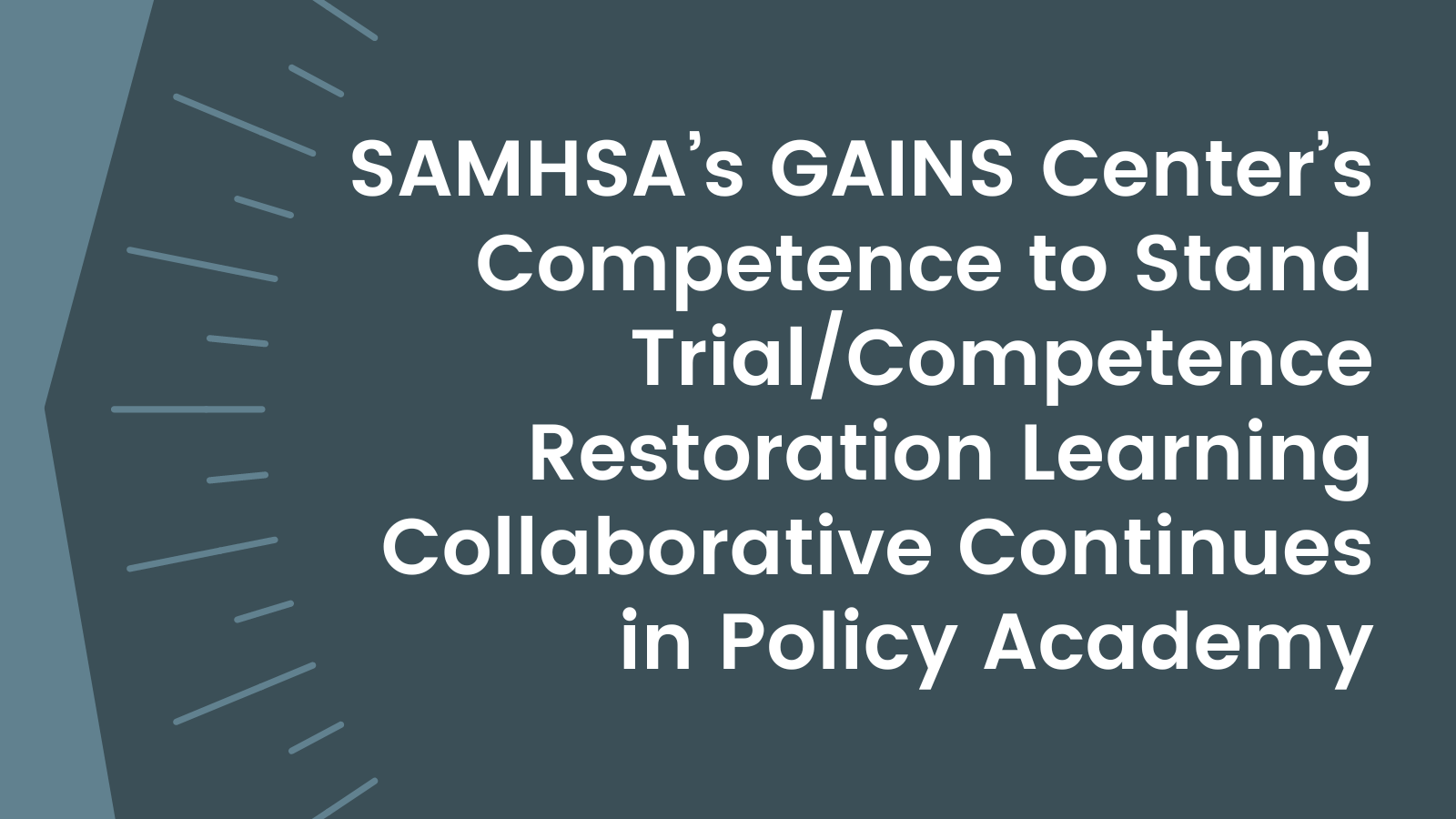In April 2023, the Competence to Stand Trial/Competence Restoration Policy Academy was held in Rockville, Maryland. This Policy Academy (PA) extended the work of SAMHSA’s GAINS Center for Behavioral Health and Justice Transformation’s national technical assistance on this topic. Facilitated by SAMHSA’s GAINS Center (operated by Policy Research Associates [PRA]), the PA was centered on best practices in Competence to Stand Trial (CST) and Competence Restoration (CR), focusing on people with criminal legal system involvement within the trial process who exhibit signs or symptoms of conditions that can impair the ability to competently proceed.
Five teams representing Alabama, the District of Columbia, North Carolina, New Mexico, and Texas attended, along with subject-matter experts (SMEs), facilitators from SAMHSA’s GAINS Center, and the Substance Abuse and Mental Health Services Administration (SAMHSA). Four of the five teams had previously been involved with SAMHSA’s GAINS Center’s CST/CR Learning Collaborative (LC). LCs are peer-to-peer models in which local jurisdiction teams work with SMEs to create coordinated strategic plans and implementation strategies for a focus topic.
Starting in 2019, the CST/CR LC enabled over 25 national leaders to bring their knowledge and expertise to aid 14 teams in developing strategic plans to identify goals and implement policies. Among these teams’ accomplishments were the following:
- a statewide Sequential Intercept Model (SIM) Mapping Workshop of the competence system
- a statewide initiative to address waitlists
- a statewide quality assurance review of competence evaluations complemented by recommendations for improvement
- a statewide summit on improving treatment services
- legislation to aid community-based outpatient competence restoration
- initiating pilot programs for outpatient and jail-based community restoration
The PA model provides time and space for teams to dedicate themselves exclusively to this focus area of their work while engaging with SMEs and learning about emerging best practices. The PA held in Rockville, MD, focused on connecting with state and local leadership, identifying possible improvements to the competence system, developing best practices to share nationally, and creating 3–5-year strategic plans for each team to use in goal implementation.
There was uniform agreement among the five teams that a group or panel should be formed to generate model legislation on competence issues. The CST/CR LC has helped change policy and practices at agency and county levels, but legislation has, so far, failed to reflect best practices. Such a group or panel would be a means of driving legislation toward consistency with policy.
After the PA, the GAINS Center continued providing expert assistance to each of these teams, aiding them in building on the work begun in the PA, including:
- evaluation and analysis of pilot programs
- optimizing early identification and screens of system-involved individuals
- site visits for the purpose of educating on best practices in community-based diversion programs
- strategic planning with team facilitators
- drafting regionalized evaluation processes
PRA has prioritized setting a national research agenda to begin filling existing data gaps, informing and guiding best practices, and improving CST/CR processes nationally. A new GAINS publication will appear this summer, featuring a thorough review of CST research and policies.
Lisa Callahan, PhD, a Senior Research Associate at PRA and GAINS project lead of the CST/CR LC, emphasized how much the team members who attended the PA appreciated cross-jurisdiction learning as well as their ongoing dedication to progressing this important work. “We help make the connection,” Callahan said. “They’re the ones who pick it up.”
SAMHSA will be releasing a document created by GAINS Center staff on competence to stand trial and competence restoration, including a comprehensive review of research, state statutes, and assessment measures.


